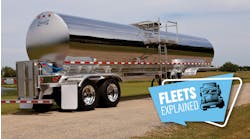President-elect Donald Trump’s pick for the next Environmental Protection Agency head is poised to weaken agency regulations quickly.
Trump announced he would appoint Lee Zeldin, a Republican and former New York U.S. representative, as EPA administrator. In the announcement, Trump promised that Zeldin “will ensure fair and swift deregulatory decisions that will be enacted in a way to unleash the power of American businesses.”
The EPA appointment is a major step in Trump’s plans to once again roll back environmental regulations. The nomination requires Senate confirmation in 2025.
What the new EPA head means for trucking
A second Trump administration will likely bring major cuts to emissions standards, significantly changing the trucking industry’s regulatory future.
See also: FMCSA’s administrator turnover troubles have been bipartisan
Zeldin’s fossil fuel history
Zeldin has a track record for promoting fossil fuels and opposing emissions regulations. As Politico reports, Zeldin pushed for fracking practices and pipeline construction while opposing gas taxes and bans on combustion engines.
Trump's campaign also promised to weaken emissions regulations. “On Day One of the Trump administration, not only will Crooked Joe’s electric vehicle mandate be terminated, but any Biden waiver allowing gasoline-powered cars to be outlawed will be immediately revoked,” the Trump campaign told Politico in March.
As administrator, Zeldin would have influence over the trajectory of EPA’s emissions rules. Regulations like the controversial heavy-duty greenhouse gas standards (GHG3) could be significantly weakened.
Environmental regulations affect equipment costs
Emissions standards are important for environmental and public health but also tend to make heavy-duty equipment more expensive.
“We’re looking at projected increases in vehicle cost of $25,000 or more beginning with the 2027 model year, including higher prices and increased extended warranty coverage expenses,” Brian Antonellis, SVP of Fleet Advantage, said in May.
With deregulation, the increase in future vehicle costs may be less severe.
Deregulation would not likely remove GHG3 altogether but rather replace the rule with a much weaker version. The first Trump administration had done so with vehicle emissions standards in 2020.




